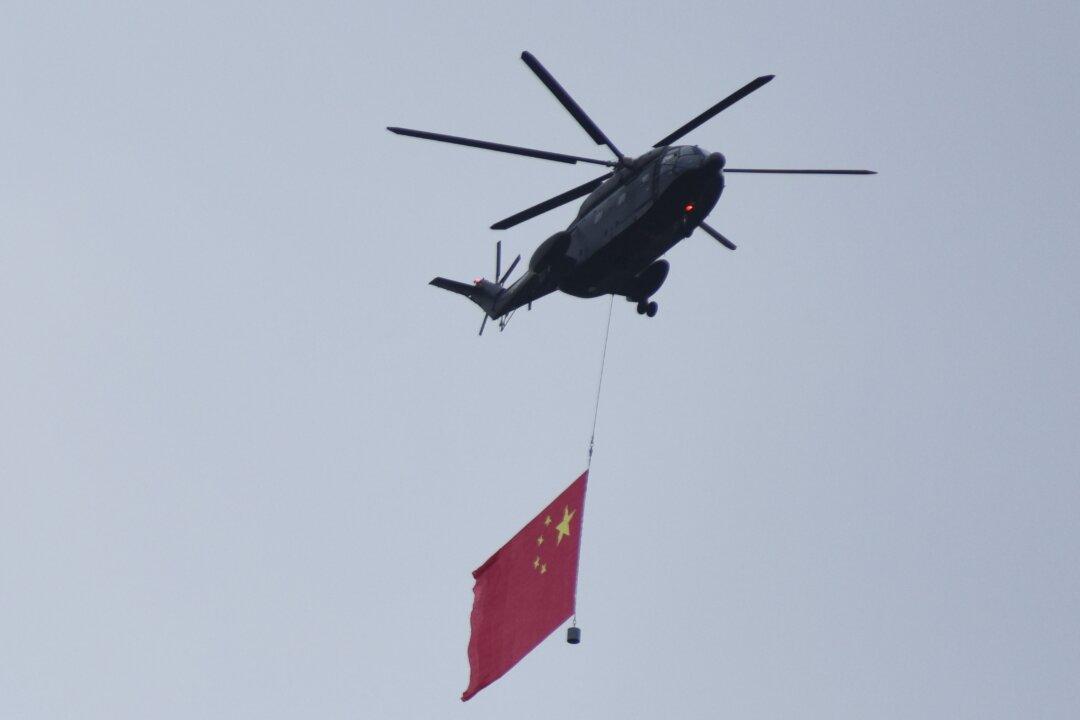As the Chinese regime and military ready up for the Sept. 3 parade marking the 70th anniversary of the World War II defeat of Imperial Japan, reports of military helicopters crashing and killing pilots raises questions about the preparedness and efficiency of Chinese forces.
On Aug. 21, the Asahi Shimbun, a Japanese newspaper, reported that a Chinese helicopter went down on Aug. 16 in the outskirts of Beijing, killing three crewmen. Because regime censors banned all reporting on the incident, information could only be corroborated from local witnesses and other unofficial sources, Asahi said.
The helicopter was reportedly taking part in parade preparations when it crashed in the early afternoon. Military personnel ordered locals at the crash site in Tongzhou, part of Beijing, to keep silent about the incident, according to Asahi.
In anticipation of the Victory Day parade, Chinese authorities are cracking down on excessive traffic, pollution, and independent online commentators. Beijing authorities have closed off many of the capital’s main avenues.
The parade is to include 12,000 troops and will feature a wide range of vehicles and aircraft. Netizens have pointed out that from the rehearsals, many of the female soldiers are in fact models, selected for similar looks, height, and possibly chest profile.
The Asahi Shimbun reported that about 40 military helicopters were flying a formation on Aug. 20.
More recently, reports by Bowen Press, associated with the Chinese-language, North Carolina-based Boxun website, and New Tang Dynasty Television of New York, said that another crash had occurred on Aug. 31.
According to the reports, unnamed Chinese military sources said that a Z-9 utility helicopter had crashed in “a remote area.” The aircraft was operated by the aviation branch of the People’s Liberation Army (PLA) land forces. The number of casualties, if any, is unknown.
The sources said that the helicopter that had crashed on Aug. 16 was a Z-8, a Chinese-produced variant of a French transport design. The Z-9, produced at a plant in Northeast China, is also based on a French model.
The aviation branch of the PLA was established recently, and suffers from a lack of experience and pilots, according to military sources cited by Boxun. To avoid accidents that might harm officers’ careers, the entire branch reduced training time and the technical difficulty of assignments, Boxun said.
Corruption and corner-cutting is common in the Chinese military, which officially answers not to China’s civil government, but the Communist Party. Funds meant for weapons and equipment procurements, training, and maintenance are often embezzled.
During the 2008 Wenchuan earthquake in Sichuan Province that killed nearly 70,000 people, rescue efforts were hampered by weak or destroyed land infrastructure in the affected areas. Unfamiliar with the misty weather, pilots flying Chinese relief helicopters dared not approach the disaster zone, leading to then-Premier Wen Jiabao rebuking the armed forces. One Russian-designed Mi-17 transport helicopter crashed during the relief efforts.
Xia Yeliang, a visiting fellow at the Cato institute, an American think tank, told Voice of America that the actual combat effectiveness of the PLA is weak. He compared the state of personnel morale and corruption in the ranks to the situation that China’s last imperial dynasty, the Qing, faced in the late 1800s and early 20th century before its collapse.
“Military corruption is very serious,” Xia said, referring to the the PLA. “Dedicated funds were misappropriated by officials. How can troops like this really fight?”




